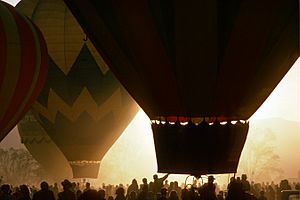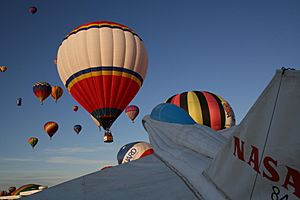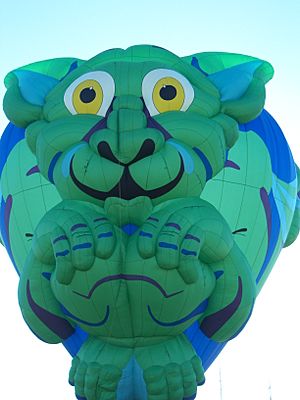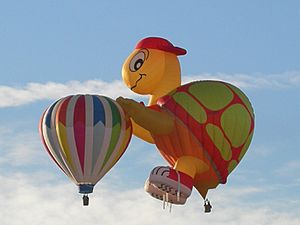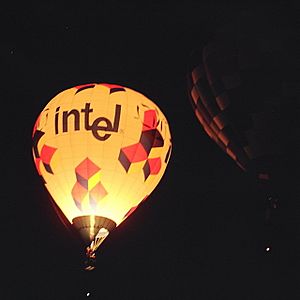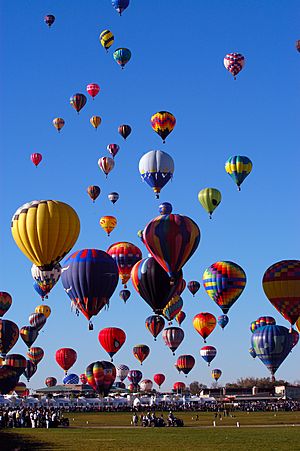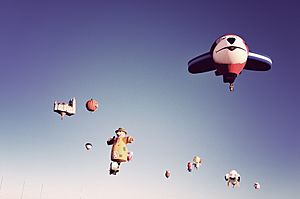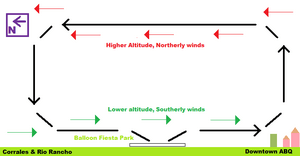Albuquerque International Balloon Fiesta facts for kids
The Albuquerque International Balloon Fiesta is an amazing hot air balloon festival that happens every year in Albuquerque, New Mexico. It takes place in early October and lasts for nine days. This festival is the biggest balloon event in the world! It started small with only 13 balloons in 1972. Now, over 500 hot air balloons fill the sky each year.
Contents
History of the Fiesta
The Balloon Fiesta began in 1972. It was part of a 50th birthday party for a radio station called 770 KOB Radio. The radio station manager, Dick McKee, asked Sid Cutter if they could use his new hot air balloon. Sid Cutter was the first person in New Mexico to own a hot air balloon.
They talked about ballooning and wondered how many balloons they could gather. The biggest gathering at that time was 19 balloons in England. Sid Cutter agreed to try and get 19 balloons. He found 21 pilots who wanted to come, but bad weather stopped some of them.
So, the first fiesta happened on April 8, 1972, with 13 balloons. It was held in a shopping mall parking lot and had 20,000 people watching! Balloonists came from many different states.
The First Race
The first fiesta had a fun race called the "Roadrunner-Coyote Balloon Race." One balloon was the "Roadrunner," and the others were "Coyote" balloons. The "Coyote" balloon that landed closest to the "Roadrunner" won. This special race is still a part of the Balloon Fiesta today!
Growing Bigger
The next year, Albuquerque hosted the first World Hot-Air Balloon Championships. This made the fiesta an international event. In 1975, the fiesta moved to October because it's a better time for flying balloons than February.
The Balloon Fiesta kept growing for many years. In 2000, there were 1,019 balloons! To make sure the event stayed fun and safe, the organizers decided to limit the number of balloons. Now, around 600 to 1,000 balloons take part. On any given day, up to 100,000 people might be on the launch field. They get to see the balloons inflate and take off up close!
In 2020, the fiesta had to take a break because of the COVID-19 pandemic. But it came back in 2021!
Exciting Events
The Balloon Fiesta has many amazing events that you can watch or even take part in!
Dawn Patrol
The Dawn Patrol started in 1978. Some pilots take off before the sun rises, while it's still dark. They use special lights on their balloons. These pilots help other balloonists by checking the wind conditions high up in the sky. This helps everyone know how the winds are blowing before the main launches.
Mass Ascensions
This is one of the most popular events! All the balloons launch in two big groups, filling the sky with hundreds of colorful balloons at once. People called "zebras" (because of their black-and-white striped outfits) help direct the balloons. They make sure all the balloons take off safely and in an organized way.
Special Shape Rodeo
Imagine seeing balloons shaped like a giant milk cow, a wagon coach, or even soda cans! The Special Shape Rodeo is when many uniquely shaped balloons launch at the same time. It's a favorite part of the fiesta for families because you can see all sorts of creative and fun balloon designs.
Balloon Glows
At night, many balloons are lit up by their propane burners. They stand still on the field and glow like giant lanterns. It's a beautiful sight! The "Glowdeo" is a special night glow just for the unique shape balloons.
Other Fun Events
- The Fiesta Challenge: Balloonists try to drop a marker as close as possible to a target on the ground.
- America's Challenge Gas Balloon Race: Special long-distance gas balloons are launched. The winner is the balloon that travels the farthest, sometimes even reaching Canada or the U.S. East Coast!
- Flight of the Nations Mass Ascension: Balloonists from different countries launch one by one, while their national anthem plays and they wave their country's flag.
- There are also other competitions that test piloting skills and speed.
- Music Fiesta: The festival often has concerts and shows with different artists.
- Rainbow Ryders: This is the official company where people can book and enjoy a hot air balloon ride during the fiesta!
Why it's Important to Albuquerque
The Balloon Fiesta is a huge event for New Mexican culture and history. It's one of Albuquerque's biggest tourist attractions and brings a lot of money to the city and local businesses. Many people in Albuquerque are also balloonists themselves!
Thousands of visitors take pictures of the balloons. For many years, a camera company called Kodak sponsored the fiesta. More recently, another camera company, Canon, has been a sponsor.
The Albuquerque Box
The success of the fiesta is partly thanks to the cool October mornings and something special called the Albuquerque box. This "box" is a pattern of winds that helps balloonists fly. Close to the ground, the winds usually blow from the north. But higher up, they tend to blow from the south.
Balloonists use these winds to fly in a "box" shape. They go up a little, move south, go up higher, move north, then come back down. This allows them to return to the launch park or land nearby. It's pretty clever!
Location
The balloons launch from Balloon Fiesta Park, which is on the northern edge of Albuquerque. This park is used for many other events throughout the year. In 2005, the Anderson-Abruzzo Albuquerque International Balloon Museum opened at the park. This museum teaches visitors all about the history, science, and art of ballooning and other types of flight.
Images for kids
See also
 In Spanish: Festival Internacional de Globos de Albuquerque para niños
In Spanish: Festival Internacional de Globos de Albuquerque para niños
 | Toni Morrison |
 | Barack Obama |
 | Martin Luther King Jr. |
 | Ralph Bunche |


